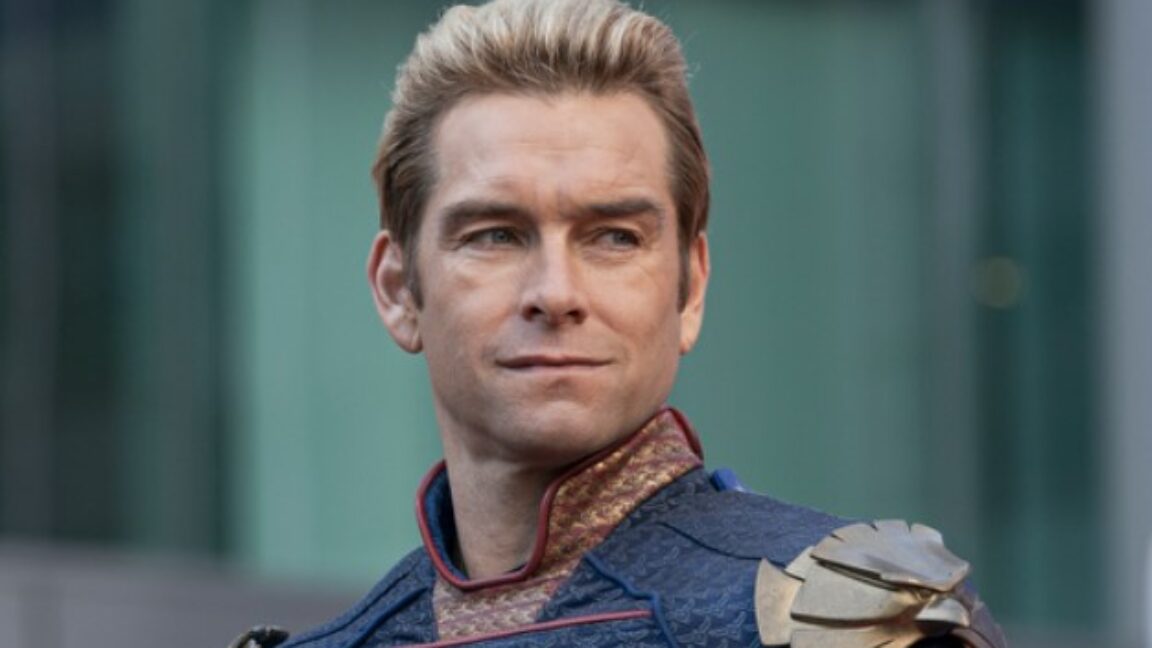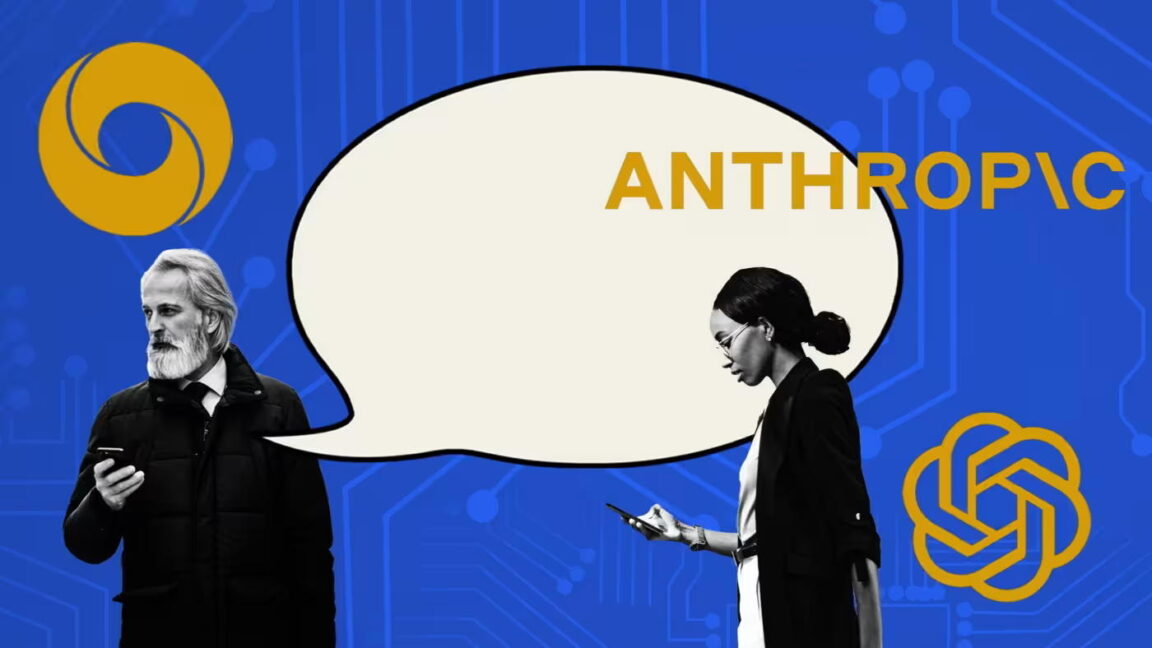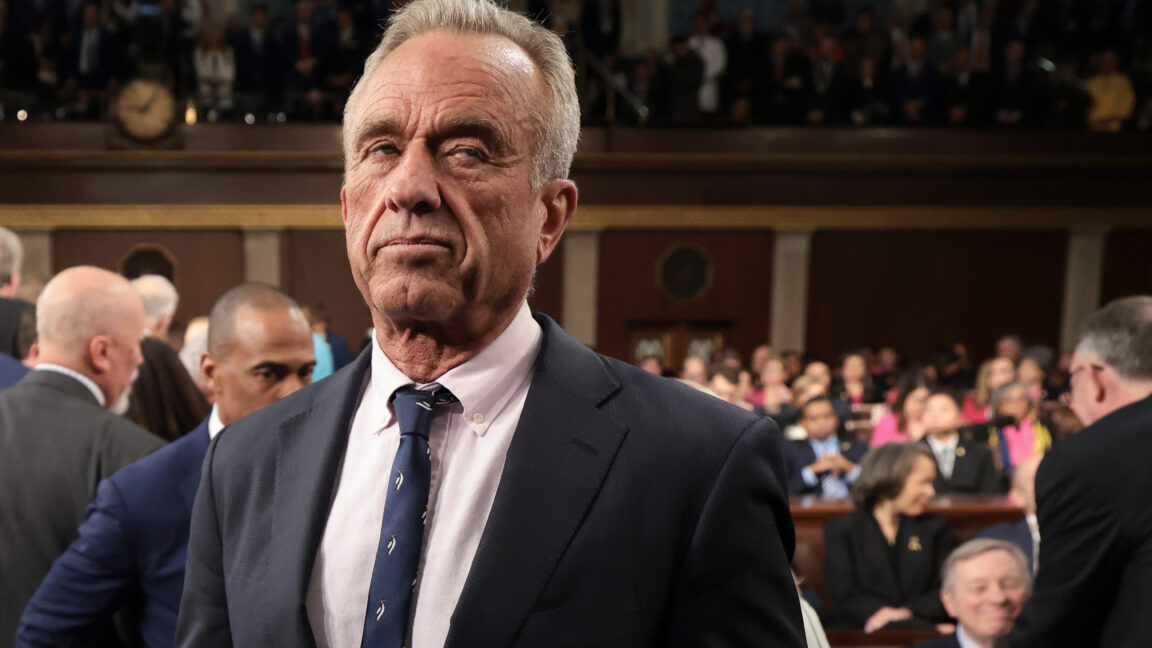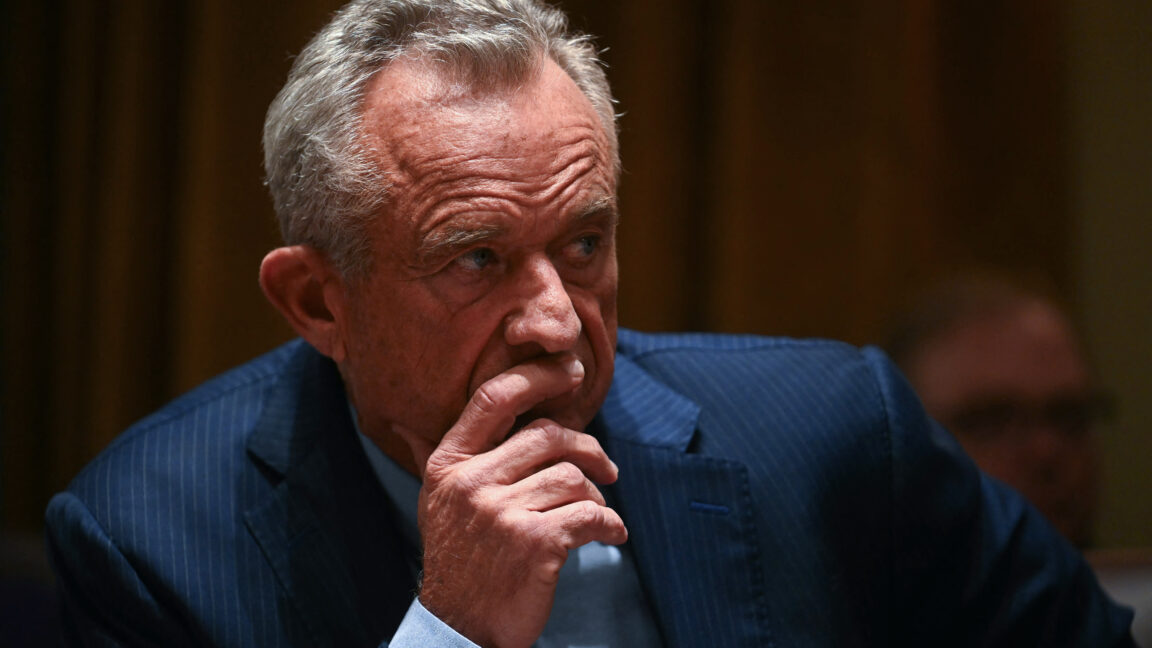The Trump administration has upended plans that state governments made to distribute $42 billion in federal broadband funding, forcing state officials to scrap much of the preparation work they did over the previous couple of years.
Secretary of Commerce Howard Lutnick essentially put the Broadband Equity, Access, and Deployment (BEAD) program on hold earlier this year and last week announced details of a rules overhaul that requires states to change how they distribute money to Internet service providers. To find out how this affects states, we spoke with Andrew Butcher, president of the Maine Connectivity Authority (MCA).
"We had been in position to be making awards this month, but for [the Trump administration's] deliberations and program changes, so it's pretty unfortunate," Butcher told Ars. Established by a 2021 state law, the MCA is a quasi-governmental agency that oversees Maine's BEAD planning and other programs that increase broadband access.
"This is the construction season," Butcher said. "We planned it so that projects would be able to get ready with their pre-construction activities and their construction activities beginning in the summer, so they would have all summer and through the fall and early winter to get in motion." The National Telecommunications and Information Administration (NTIA), a division of the Commerce Department, "has now essentially relegated the process to not even begin pre-construction until late fall, early winter at the earliest," he said.
The Biden administration spent about three years developing rules and procedures for BEAD and then evaluating plans submitted by each US state and territory. Maine has been working on its plans for about two years, Butcher said. The process included analyzing which addresses in Maine are unserved and eligible for funding to subsidize network construction, and inviting ISPs to bid on projects. Maine and other states will have to go through the bidding process with ISPs again due to the overhaul.
Two years of work in two months
The change "undoubtedly creates additional work and effort for Maine and every other state and territory," Butcher said. "So we will execute it as quickly and efficiently as possible, but it kind of jams two years of work into two months." The new timeline is difficult, but "Secretary Lutnick has committed that funds will be awarded and projects started this year. We're going to hold them to that," he said.
Butcher said he was relieved that the BEAD program wasn't canceled entirely. He pointed to President Trump's recent move to kill the separate $2.7 billion grant program created by the Digital Equity Act of 2021.
Maine was supposed to receive $35 million from the Digital Equity Act for several programs that would provide devices, digital skills training, STEM education, telehealth access, and other services. Trump claimed the Digital Equity Act is "racist and illegal."
Butcher said that "for all anyone knows, it was canceled simply because the word 'equity' is in it." He pointed out that the same word appears in the title of the Broadband Equity, Access, and Deployment program. Given that, "the updated policy guidance for the BEAD program could have been worse," Butcher said.
US eliminates fiber preference
Lutnick and other Republicans didn't like the Biden administration's decision to prioritize the building of fiber networks in BEAD, arguing that fixed wireless and satellite services like Starlink should have an equal shot at obtaining grants. The NTIA said on June 6 that states and territories must conduct "an additional 'Benefit of the Bargain Round' of subgrantee selection that permits all applicants to compete on a level playing field." That will give non-fiber ISPs a better chance to obtain grants.
Senate Democrats accused the Trump administration of forcing states to subsidize Starlink instead of more robust fiber networks.
"States must maintain the flexibility to choose the highest quality broadband options, rather than be forced by bureaucrats in Washington to funnel funds to Elon Musk's Starlink, which lacks the scalability, reliability, and speed of fiber or other terrestrial broadband solutions," Senate Democrats wrote in a May 30 letter to Trump and Lutnick. The letter said that forcing states to scrap their previous work could cause them to "not only miss this year's construction season but next year's as well, delaying broadband deployment by years."
Commerce Secretary slammed cost
Lutnick has pushed for lower per-location costs and made a social media post criticizing Nevada's plans. "The Biden Administration approved their BEAD application with 24 project areas in the state with a PER LOCATION cost of over $100,000 each, incredible," Lutnick wrote. "One location cost over $228,000!! We will stop this absurd spending while delivering the benefit of the bargain by connecting unserved communities with satellite, fixed wireless, and/or fiber: whichever makes the most economic sense."
Lutnick also complained that "Congress set aside $42.45 billion for rural broadband in November 2021. More than three years later, not a single person has been connected to the Internet under the BEAD program."
Sen. Jacky Rosen (D-Nev.) called Lutnick's complaint disingenuous. "You've been holding up BEAD funding that was already APPROVED for my state since January, and you're complaining no one has been connected yet?" she wrote.
Butcher said he trusts the expertise of Nevada's broadband office to "make the most of the available funding," even if Lutnick thinks the state is spending too much in some areas. "We are talking about facilitating a once-in-a-lifetime level of critical infrastructure investment," Butcher said. "Every place is going to be different."
Butcher said Lutnick is exercising "authority as a central government over the rights and expertise of a state body, which I guess I don't understand how the party's values work anymore, but that to me feels like a pretty strange Republican imposition."
Butcher still expects significant fiber deployment
Overall, Nevada's plan was to use $416 million to connect 43,715 households and businesses. Maine was to receive about $272 million, which Butcher said would "provide deployment to about 25,000 unserved households and businesses" and about 3,500 community anchor institutions. Anchor institutions under the BEAD program can include places like schools, libraries, hospitals and other health facilities, public safety facilities, public housing, and community centers.
"With our available funding, we really don't have the ability to consider a cost per passing anywhere near" the $228,000 example cited by Lutnick, Butcher said. "We have to be resourceful and efficient in the decision-making... to squeeze the value out of that as much as possible."
Fiber is Butcher's first choice, and he said he is not convinced that the Trump administration's new guidelines will significantly reduce the amount of fiber deployment that ultimately happens once BEAD funds are finally spent.
"The introduction of more of a preference or bias towards the cheapest deployment option... actually may very well drive competition and further incentivize fiber providers to be more aggressive" in their bids for projects, he said.
Still, he said the cost of laying fiber lines in certain locations means that wireless and satellite networks have their place. "There are some places where fiber is a prohibitive cost. Maine is a big place without a lot of people," Butcher said.
Starlink not the first choice
When the government gives money to a fiber ISP to subsidize deployment, it's easy to see the results: The provider is required under the terms of the grant to install fiber at homes and businesses that weren't previously served. The benefits aren't as immediately clear with Starlink, which is already deploying satellites that can serve most of the country.
But residents can benefit from deals between Starlink and local governments by gaining access to equipment and higher levels of service. Maine already partnered with Starlink last year to coordinate bulk purchases of equipment for Internet users and guarantee service availability.
Starlink availability and speed varies by region. But with last year's deal between Maine and Starlink, "we've been able to establish a network reservation to ensure a higher standard of service performance," Butcher said. He called Starlink a great option for remote areas but said that satellite is "far from the policy standard that we should be looking to" for every location in Maine.
Despite the BEAD holdup and Digital Equity Act cancellation, the MCA has been distributing other funds. "Over the last three years, MCA has facilitated over $250 million in public and private investments to address about 86,000 unserved locations," Butcher said.
With the BEAD changes, Butcher said the MCA is ready to do the work needed to obtain the funding. "I think in the context of our DOGE environment, it's important to note that teams like the MCA team are ready to rise to the moment and to do really hard work. But this is the kind of thing that absolutely grinds people down," Butcher said. "It's not just MCA, it's this entire network of Internet service providers, their subcontractors, workforce training providers, community volunteer broadband committees. These investments are reflective of an entire ecosystem which doesn't just entail pole-in-the-ground and attaching wires to the pole and equipment to that. It is a robust set of public-private partnerships."
Read full article
Comments
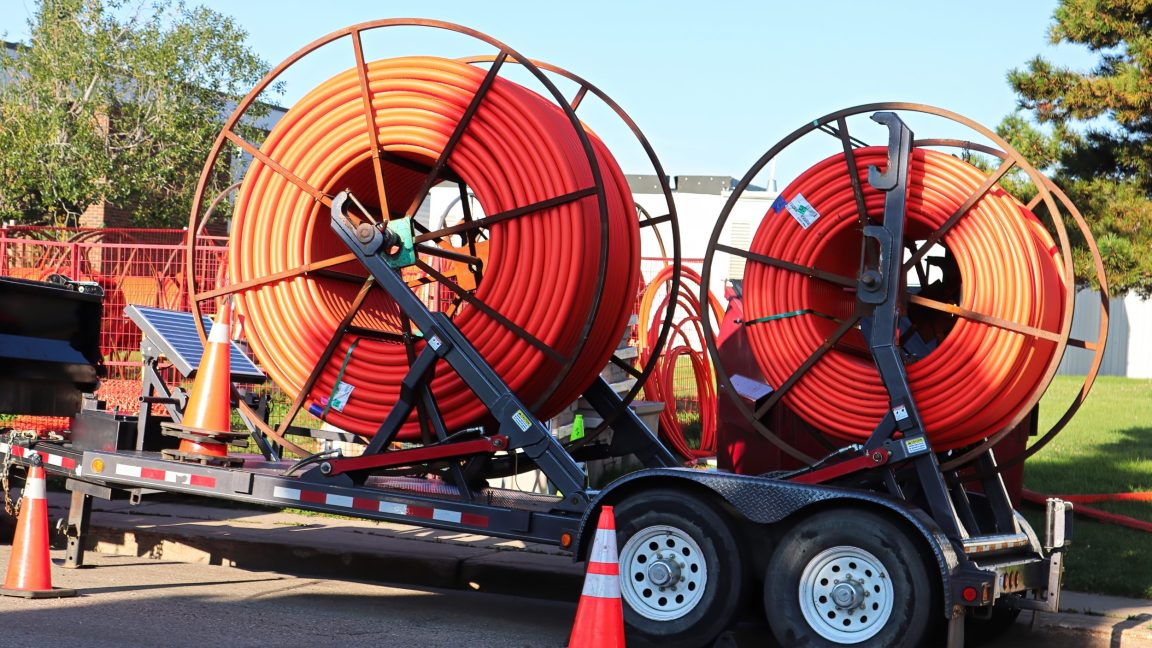
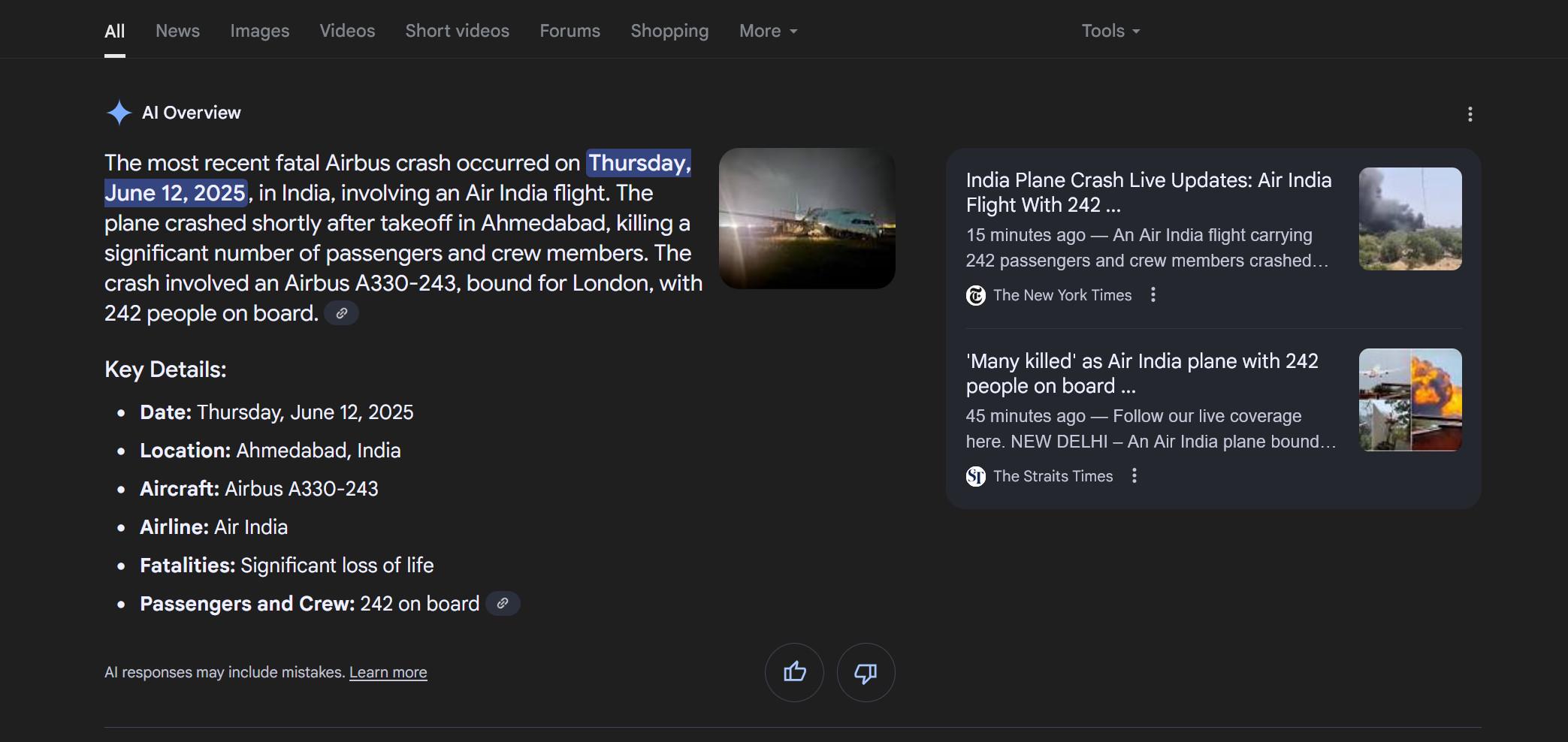 In this search, Google's AI says the crash involved an Airbus A330 instead of a Boeing 787.
Credit:
/u/stuckintrraffic
In this search, Google's AI says the crash involved an Airbus A330 instead of a Boeing 787.
Credit:
/u/stuckintrraffic



